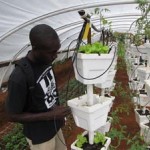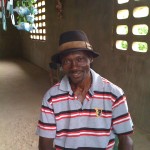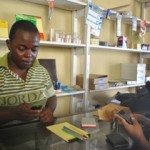In 2010, Béliard Miracle was an unknown farmer in the Kenscoff region of Haiti. His meager income came from small harvests of vegetables that he cultivated in difficult conditions, without the benefit of modern production techniques. With limited access to markets, he made just $1,000 per year.

In the mountains of Kenscoff, Mrs. Jane Wynn recently made part of her land available to a program that is helping farmers grasp innovative techniques in order to double their yields and increase their income - 1,500 farmers, to be exact.
The USAID-financed program is called WINNER, and its rural Center for Sustainable Development (CRDD) is what first caught the attention of Mrs. Wynn, a Haitian-American who saw an opportunity to both advance her ecological interest and the livelihoods of Kenscoff farmers. Launched in 2009, WINNER is a five-year, $126 million USAID program managed mostly by Haitians and built on a network of over 25 farmers' associations in conjunction with the government and others to form public-private partnerships (PPPs).

Haitian mango farmers like Gardien Saintvil receive the best price for their fruit by selling it when ripe. But Saintvil has a powerful incentive to harvest too early and sacrifice much of the value of his mangoes.

The Haitian Government is determined to improve the quality and scope of public services, but it faces a critical problem —lack of revenue. At 9 percent, Haiti’s rate of tax receipts as a share of gross domestic product (GDP) is one of the lowest in the world. However, a recent USAID-piloted tax mobilization program in the city of Saint Marc has proven that it is possible to raise local revenues to pay for quality local services.
Building on that success, USAID expanded its work to the densely populated urban municipality of Carrefour in 2011. Working with the Groupe de Recherche et d'Interventions en Developpement et en Education (GRIDE), a Haitian nonprofit organization of public policy experts, USAID sparked a significant jump in Carrefour’s municipal revenue — taxes collected increased by 481 percent, from $309,000 in 2011 to $1.8 million in 2012.

The 2010 earthquake in Haiti disrupted bank, microfinance institution, credit union, and remittance paying agent operations. Access to financial services required even greater travel time and longer waits due to damaged roads and destroyed financial institution buildings. The need for convenient, secure and affordable financial services became more apparent than ever.
In response, USAID and the Bill & Melinda Gates Foundation pioneered the Haiti Mobile Money Initiative (HMMI). HMMI provides incentives to encourage private sector development of mobile money services in Haiti, where only an estimated 15 percent of Haitians have access to financial institutions. At the end of 2010, through mobile phone companies Digicel and Voila, the initiative launched two mobile money services, TchoTcho Mobile and T-Cash. Clients are now able to make payments, send and receive transfers, and keep balances safely and conveniently on their mobile phones.








Comment
Make a general inquiry or suggest an improvement.